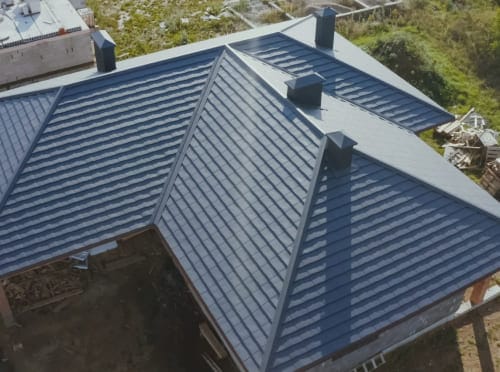When deciding whether a flat roof or a pitched roof is better for your home, there are many factors you should consider beyond just the appearance. The initial price, durability, and cost for maintenance should all have a bearing on your final choice.
Purchasing a roof is a major undertaking. Knowing the pros and cons of both flat roofs and pitched roofs will help you to make an informed decision.
Advantages and Disadvantages of a Flat Roof
A flat roof is a type of roof that is almost entirely flat but has a slight pitch for easy water drainage. Flat roofs are common for commercial properties, but some newer residential properties have flat roofs. There are both advantages and disadvantages to a flat roof.
These are some of the advantages:
- Cost-effective installation: A flat roof is typically cheaper to install compared to a pitched roof, and the materials that flat roofs require are more affordable
- Stylish: Flat roofs typically enhance the appearance of a home by giving it a more sleek, minimalist, and modern look
- Easier maintenance: Due to easy access, flat roofs are easier to inspect, clean, and maintain
- Energy efficiency: A flat roof can save a homeowner on energy costs because it absorbs less heat, which helps to regulate the temperature indoors
The drawbacks of flat roofs include:
- Problems with water drainage: Without a steep slope, flat roofs tend to have problems with accumulating water, which causes leaks and, eventually, structural damage
- Shorter lifespan: Since they use cheaper materials, flat roofs aren’t as durable as pitched roofs
- More vulnerable to weather: A common problem for flat roofs is snow accumulation, which could lead to collapse if not tended to promptly
- Limited choices: When choosing which type of material to use, flat roofs have a more limited selection
Advantages and Disadvantages of a Pitched Roof
Pitched roofs, being in the shape of a triangle, are steeper than flat roofs. Like flat roofs, there are advantages and disadvantages to pitched roofs. Some of the most common pros include the following:
- Optimal water drainage: Since a pitched roof has a steep slope, this allows water from rain and snow to drain, thus lowering the risk of leaks and water damage
- Longer lifespan: Pitched roofs, being less susceptible to wear and tear than flat roofs, may last for 50 years or more if a quality material is chosen
- Variety of choices of materials: A pitched roof can be constructed from several materials, including shingles, tiles, and even metal
- More space: The slope of a pitched roof can provide more space for a homeowner, who may choose to use it as an attic for storage or even a loft
Some of the disadvantages of a pitched roof are:
- Costly installation: Pitched roofs are typically more expensive to install because they need more materials and labor due to their complex design
- Challenging maintenance: While pitched roofs are more durable than flat roofs, inspection and maintenance can be very dangerous and would call for professional assistance
- Weightier: A pitched roof is a lot heavier than a flat roof, requiring extra structural support, which can be very costly
- Limited outdoor space: Due to being sloped, a pitched roof offers no functional outdoor space for installing a terrace or rooftop garden
Make the Right Choice
When deciding which type of roof to choose for your home, considering the climate should always be a factor in areas prone to heavy winters. Additionally, you need to think of your budget along with your long-term plans.
Are you looking to enjoy outdoor space with your family on a flat roof? Or are you looking for more storage space in an attic with a pitched roof? These are just some of the many factors to consider before making the costly decision of the type of roof for your home.
Get Professional Advice First
Whether you are planning to build a new home or are looking to upgrade your existing roof, speak to roofing professionals, like JP Carroll Roofing, first before making any purchases. Working with a professional roofing company will ensure that your home has the best roof type for your personal needs.
Having over 30 years of experience in Massachusetts and Connecticut, we can explain in detail the pros and cons each type of roof could pose to your specific area. Call us today at (860) 215-2644 to get started on roofing your home the right way!


